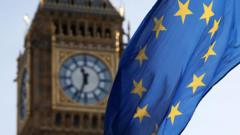As the UK and EU prepare to engage in their inaugural post-Brexit summit, the focus lies on rebuilding relationships through coordinated efforts in trade, defense, and shared geopolitical strategies. Both sides face complex negotiations but express willingness to improve ties amid global challenges.
UK-EU Summit: Navigating a New Era of Cooperation Post-Brexit

UK-EU Summit: Navigating a New Era of Cooperation Post-Brexit
The UK and EU aim for closer ties in their first bilateral summit since Brexit, addressing trade, defense, and geopolitical concerns.
The UK and the EU are set to engage in an essential bilateral summit in London, marking their first formal meeting since the extensive changes brought by Brexit. Attendees and analysts alike stress the importance of this gathering, citing it as a turning point in the relationship between the two parties, even as challenges remain.
The prevailing sentiment is that the mistrust stemming from Brexit has diminished significantly, largely due to pressing global issues like the war in Ukraine and tensions with Russia and China. This context has propelled both regions to seek more robust cooperation. Experts underline the importance of solidifying this partnership in light of international uncertainties, with added pressure from leaders across Europe, including a notable push from France.
Interestingly, a pre-summit development revealed an invitation extended to French President Emmanuel Macron for a state visit to the UK, potentially aimed at mending ties. Analysts note that while many EU nations favor improved relations with the UK, France maintains a cautious stance over critical issues like fishing rights and defense contract bidding.
The summit is poised to produce significant announcements, including a declaration addressing shared foreign policy objectives, an EU-UK security and defense agreement, and plans to reduce trade barriers imposed post-Brexit. However, these agreements may not yield the ambitious changes some anticipated, as key governmental red lines remain firm, limiting the scope of trade improvements.
The UK is gearing up to address sector-specific trade barriers, especially regarding agricultural products, while the EU seeks to maintain stringent standards and oversight from its legal frameworks. Divergent interests continue to shape discussions, with differing priorities especially on fishing rights expected to complicate negotiations.
On matters of mobility, the UK hopes to secure recognition of professional qualifications, while the EU advocates for youth mobility schemes benefiting EU citizens. While both sides acknowledge the pressing need to tackle illegal migration and enhance energy trade, the agreement on free access to EU databases remains contentious.
Crucially, defense cooperation will also be a focal point, as the UK promotes its role in supporting Ukraine and seeks access to EU's rearmament schemes. However, resistance arises from countries like France, which aim to prioritize EU firms for defense contracts, complicating the UK’s ambitions in this arena.
As both parties navigate these intricate discussions, the broader implications on defense spending and economic development amidst voter concerns remain significant challenges. The summit signifies an important step toward redefining UK-EU relations, but achieving substantive progress will require careful negotiation and commitment from both sides.


















